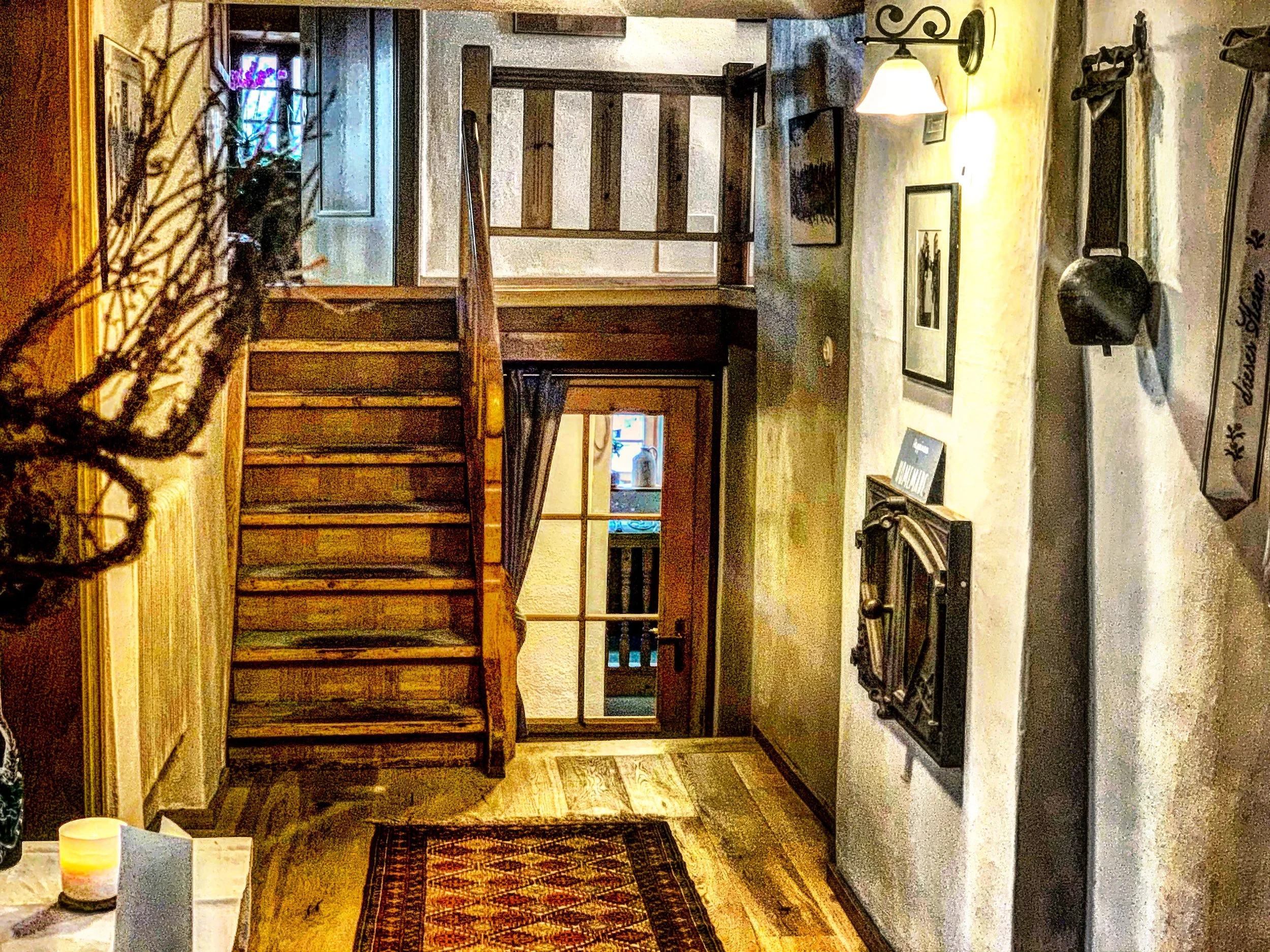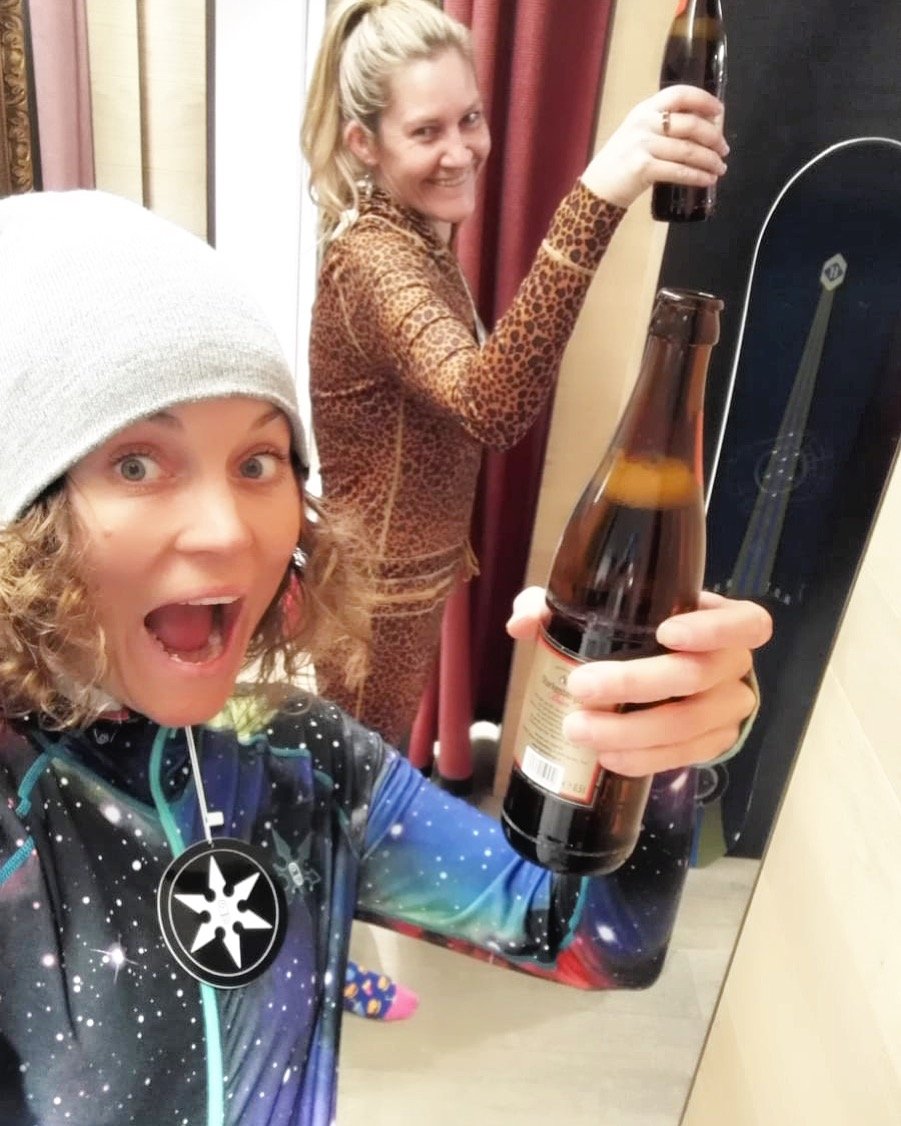Transparent Showers, Nosy Neighbours, and Shots of Schnapps: My Adventures Running an Austrian AirBnb
The Innkeeper's Tales is an ongoing series wherein we cajole the charming characters behind hotels we love to give us a peek under the covers and behind the curtains of their adventures in hospitality. Natasha Hecher was already a regular Fathom contributor when life took a turn and she ended up running her mother's Austrian AirBnb.
Somewhere in the throes of my globetrotting 30s, I resolved that children and tangibles were not for me, as my character (and dreams) were more aligned to a whimsical and possession-free existence.
But the universe had other ideas, and here I am, somewhere in the vicinity of 38 (again), living my mother’s dream of curating and running a 300-year-old guest house in Pettneu am Alberg in Tirol, Austria.
My life consists of stray cats breaking in, hedgehogs living in the garden, an underground Yahtzee ring, a plethora of strapping young men calling me Auntie Tashie (as I bake them fresh pies made with apples from the tree in the garden, while wearing a pink button-up sweater, just to complete the fantasy), an elderly neighbour who watches way too much porn, and a parade of travellers coming through, bringing their worlds to me.
My transition to badass lady boss has been an adventure in itself. As I type, I’m sitting on my mother’s throne in the kitchen, reminiscing about the last four years, no distractions except for occasional gusts of wind, a humming dishwasher, and Janis Joplin on the speaker stoking that badass fire.
The last conversation I had with my mother in late 2017 – after I had just declared that I was giving up my existence as a Jägermeister-guzzling waitress in the Alps to become a writer in a third-world country – revolved around my aspirations. She was wondering what direction my life was heading in, and I said I was unsure, but with experience in banking, stand-up comedy, travel writing, waitressing, and 43 countries traveled, I assured her that as long as I was always moving forward, I was content.
Six weeks later and two weeks after her funeral, my first guest arrived, and my past experiences converged into this unexpected direction. “This” being a warm and inviting house that smells of lemongrass and sandalwood, an inn full of quirks, stories, and (I like to wish) a happy blend of my mother’s and my visions, as well as our family history of ski racing.
It is a life’s work in progress.
That first guest was a German lady of Japanese-American heritage who arrived with her son and gave me two stars for accuracy as she “didn’t think it would be this nice.” In my defence, the shell of the listing had only gone up twelve minutes before she booked, when I had not even had time to grieve.
My mother’s living room, a space which was opened up this year, but still not a space that i can spend time in.
At first, the anxiety I experienced every time I got notification of a new review was almost crippling, as it is highly confronting walking around your home knowing that people are judging you. (A task that should be left to the neighbours looking out their windows in a tiny Alpine village.)
Waking up in a bad mood is not an option, so I have taken steps to assure that I don’t, like making a photo wall on the the staircase devoted to people and moments I love, to remind me of what I am doing, why I am doing it, and who I am doing it for. (I also wear a leopard-print onesie as a breakfast uniform to distract from my tired face.) Apparently these tactics work, as here I am, some 200+ terrific reviews later, only three of them a mere three stars.
To circumvent any surprises from either side, I invest almost too much time and energy vetting my guests in an attempt to ensure that they are a good fit for the house. After seven years working the Alpine après-ski scene, the last thing I want is drunk and disrespectful buffoons clomping around the house giving me attitude. I also have to delicately ascertain who they are traveling with as well as their heights, as many of the rooms have transparent showers, and some of them have slightly… Let's call them “constricted” space.
On one occasion I had a couple from Australia, my home country. At breakfast her first morning, the woman informed me she was a little uncomfortable with the transparent shower. (I was taken slightly aback, as she was traveling with her boyfriend, who I presume had already seen her goodies.) I apologised profusely and said that although this was standard in old Tirolean houses, I could give them a room with a separate shower. Later in the day, after moving rooms, she came down and said that they were heading to the Wellness, the local town sauna. Part of me wanted to warn her that it was a naked setting, and she would be seeing many more wing-wangs than she would through a transparent shower in her room upstairs, but, well, that was out of my jurisdiction, and I was just too amused.
“Have fun,” I replied.
After my extensive vetting, every new guest feels like my first. I await their arrival, upon which I offer them a tea, a coffee, or a schnapps while they check in. This appears to be optimal hospitality, but it really helps give me a small window onto their character. Perhaps it is the way I say it, as I do lower my voice slightly and add some cheekiness with the offer. If they take the schnapps and come into the kitchen for a chat, it is a fair indication that they are wanting to be social. If they decline all offers and make it a brief check in, they are likely to be more reserved.
My longest check-in took four hours.
This initial ritual escalated quickly into letting them know about the forbidden words around the inn. They include “Trump,” “Hitler,” “Mexit,” “Brexit,” “Covid,” and “schnapps,” which I threw in for fun. If any of these blasphemous words are uttered, a schnapps must be consumed. Naturally, this has on occasion backfired, and I often have guests arrive home, poke their head around the kitchen door, and say in a low, mischievous voice, “did someone say schnapps?” as their hand reaches from behind, offering a fresh bottle of the sweet, sweet liquid. Little wonder I have given up drinking in winter. (Mostly.)
When guests check in, I inform them that they are welcome to be as social or as private as they like — after all, it is their holiday — but that I am always available for recommendations, a cup of tea, or a round of Yahtzee. I check on their dietary requirements, as I make breakfast fresh every morning — usually muesli with Greek yogurt and berries followed by fresh farm eggs scrambled with mountain cheese, cream, and chives. The traditional breakfast around here is cheese and meats, but I am a firm believer in hot breakfast.
My approach to the house comes from my personal experiences, from places that have tickled me around the world. I have always found that the hostel atmosphere with a private room is most aligned to my nature, so it is what I do here.
Gauging people’s personal tastes is almost an art form. Some like a raucous apres-ski; others are total teetotallers. The strong majority of my guests have been incredible, and very often we part with a teary goodbye, aware that our special interaction was a moment in time, unlikely to be repeated as time passes and communication eventually becomes relegated to Facebook likes of their wedding photos and soon-to-come munchkins.
This is one reason why return guests give me the warm and fuzzies. I would have had a lot more of them were it not for the difficult last few years (I won’t say the word, as that would require a schnapps).
As far as validation goes, return guests are wonderful, but return helpers are on a whole new level. The helpers can be transient for a few weeks or they can stay for the season. I pay them a minimum salary and offer them lodging and food. They come in different forms. Maiju was a Finnish house guest who I asked to please come back forever — and she did for a season before traveling overland from Finland to Thailand. Gabby is a lawyer I knew from my Zurich banking days, who is now in Athens running a women’s centers for Syrian refugees. Sadeja is a beautiful German lass I met in a hostel in Mandalay. Currently I have Rens, a young Dutch man who tirelessly works two other jobs as well as being a very good handyman.
I give them different names, such as “minions” and “retrievers” (a story in itself), but they are so much more. Technically, they are here to help me with breakfast, rooms, and snow shoveling, but in reality they are so much more – my support system, my respite, and my friends.
The days are busy during the winter season, which runs from December to April with many ebbs and flows. Sometimes guests will come home and ask what I did all day. My eyes cheekily light up, and I say, “I just sat here, and it was amazing. I watched the house clean itself, the emails get answered, the shopping get done, the administration get sorted , and the check-ins checked in. And in the end, my legs just took themselves to the gym. All very magic flute-esque.”
It probably goes without saying that because something always goes wrong in an old house, I have been forced to acquire a new skill set. In the beginning, if a light went out or the heating spluttered, I would panic, but now I know where the fuses are and who to call. I can even change a lightbulb.
It can be challenging living in a village where tradition is in abundance, and the familiarity is one-sided. I have been required to come around to their way of thinking, even though on occasions I have a different aspect. If I had known four years ago that I simply had to be efficient in snow shovelling and have pretty flowers out in summer, I would have saved myself a lot of time. Thankfully I have all but mastered the local dialect (almost like learning the Queen’s English and then moving to the Scottish Highlands) and am now able to sit at the regulars tables at the local restaurants without feeling like an imposter. But it is hard work, and although not my consciously chosen vocation, it does have its unique and unexpected joys.
Stay tuned for the adventures of the broken plumbing and the missing Mexicans.








